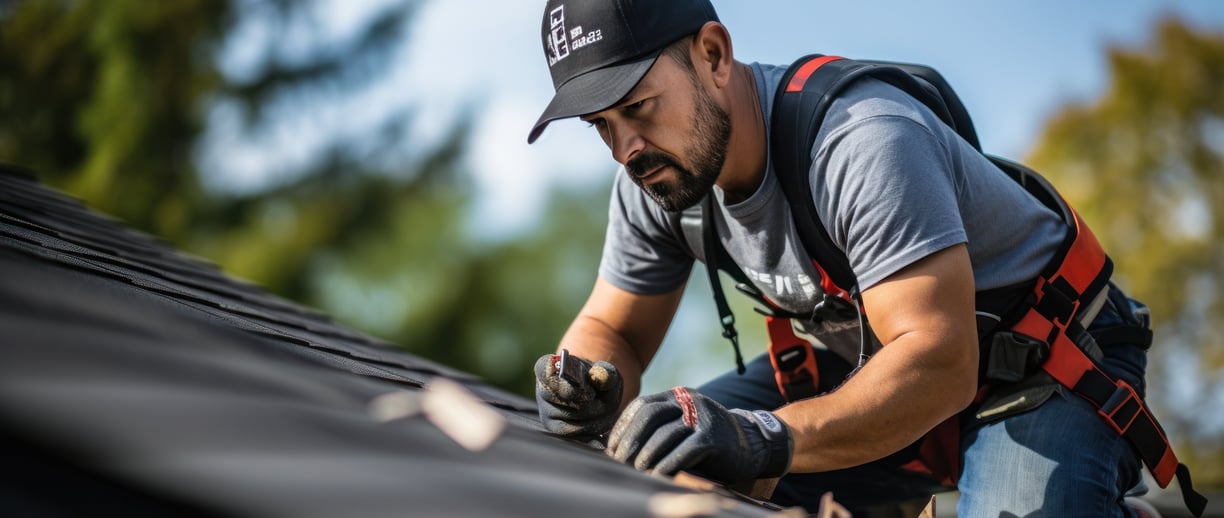How to Choose the Right Roofing Materials for Illinois
"Discover the best hurricane-resistant roofing materials for Illinois homes from experienced roofing contractors. Learn about wind ratings, impact resistance, and how metal roofing, impact-resistant timberline shingles, tiles, and synthetic options protect your home during severe weather. Find guidance on installation methods and underlayment that maximize storm protection."
3/18/20254 min read


How to Choose the Right Roofing Materials for Illinois' Hurricane Season
Illinois homeowners face unique challenges when selecting roofing materials. With hurricane season bringing intense winds, heavy rainfall, and flying debris, your roof's ability to withstand these elements is crucial for protecting your home and family. As experienced roofing contractors in Illinois, we've helped countless homeowners choose materials that offer the best protection against Illinois' extreme weather conditions.
Understanding Wind Ratings and Hurricane Requirements
Before selecting roofing materials, it's important to understand how they're rated for hurricane conditions:
Wind Resistance Ratings
Roofing materials receive ratings based on their ability to withstand specific wind speeds:
Class D: 90 mph
Class G: 120 mph
Class H: 150 mph
For Illinois and surrounding areas, roofing companies near me typically recommend materials rated for at least 130-150 mph winds to meet local building codes and insurance requirements.
Impact Resistance
Roofing materials are also rated for impact resistance on a scale of 1-4, with 4 offering the highest protection against flying debris - a common hazard during hurricanes.
Top Hurricane-Resistant Roofing Materials
1. Metal Roofing
Metal roofing has become increasingly popular for Illinois homes due to its exceptional hurricane resistance:
Advantages for Hurricane Season:
Superior wind resistance (140-180+ mph when properly installed)
Excellent impact resistance against flying debris
Lightweight, putting less stress on your home's structure
Long lifespan (40-70 years) with minimal maintenance
Interlocking panels create a watertight seal
Types of Metal Roofing:
Standing seam (highest wind resistance)
Metal shingles
Stone-coated steel
When searching for roofing supplies near me, look for metal roofing systems specifically engineered for coastal and high-wind regions.
2. Concrete and Clay Tiles
Tile roofing offers a classic Illinois aesthetic with excellent hurricane resistance when properly installed:
Advantages for Hurricane Season:
Heavy weight helps resist wind uplift
Class A fire rating
Excellent longevity (50+ years)
Natural resistance to salt air corrosion
Hurricane Considerations:
Requires proper installation with hurricane straps and enhanced underlayment
Individual tiles can break from impact, but the roof system typically remains intact
Modern lightweight concrete tiles offer improved wind resistance
Our roofing contractors recommend upgraded fastening systems and adhesives specifically designed for high-wind regions.
3. Impact-Resistant Asphalt Shingles
For homeowners seeking a more economical option, impact-resistant architectural shingles provide enhanced hurricane protection:
Advantages for Hurricane Season:
Higher wind resistance than standard shingles (130-150 mph)
Class 4 impact resistance available
More affordable than metal or tile
Familiar appearance with enhanced performance
Premium Options:
Timberline shingles from GAF with WindProven™ technology
Atlas Roofing StormMaster® Shake shingles with Scotchgard™ protection
CertainTeed Landmark® IR with reinforced construction
These premium shingles use enhanced adhesives and reinforced construction to better withstand hurricane conditions. When working with a roofing company near me, ask specifically about these hurricane-rated options.
4. Synthetic Roofing Materials
Synthetic roofing products engineered specifically for high-wind regions offer excellent hurricane resistance:
Advantages for Hurricane Season:
Lightweight yet highly wind-resistant
Superior impact resistance
Resistant to moisture damage
Can mimic the appearance of slate, wood, or tile
Options to Consider:
Composite slate tiles
Synthetic shake shingles
Polymer roofing systems
These innovative materials from reputable roofing supply sources combine the aesthetic appeal of traditional materials with enhanced performance during extreme weather events.
The Critical Role of Roofing Underlayment
While visible roofing materials receive most attention, the underlayment provides a crucial secondary water barrier during hurricanes:
Hurricane-Grade Underlayment Options:
Self-adhering modified bitumen: Creates a watertight seal that prevents water intrusion even if outer materials are damaged
Synthetic underlayment: Offers superior tear resistance compared to traditional roofing felt paper
High-temperature underlayment: Designed to maintain integrity under Illinois' extreme heat
Professional roofing contractors will recommend upgraded underlayment solutions that exceed minimum code requirements for hurricane-prone regions.
Installation Factors That Enhance Hurricane Resistance
Even the best roofing materials can fail during hurricanes if improperly installed. When evaluating roofing companies near me, ensure they implement these hurricane-specific techniques:
Enhanced Installation Methods:
Six-nail pattern: More fasteners per shingle for increased wind resistance
Sealed starter strips: Prevents wind uplift at roof edges
Enhanced ridge and hip installations: Reinforced attachment at vulnerable areas
Proper drip edge installation: Prevents water intrusion at roof edges
Strategic adhesive application: Additional sealant at critical areas
Our roofing company uses installation methods specifically designed for Illinois' high-wind zones, exceeding minimum code requirements.
Beyond Materials: System Approach to Hurricane Protection
A truly hurricane-resistant roof requires a comprehensive system approach:
Complete Roofing System Components:
Roof deck preparation: Proper attachment and sealing of the roof deck
Secondary water barriers: Additional waterproofing between deck and underlayment
Ridge vents: Hurricane-rated vents that maintain integrity during high winds
Flashing details: Enhanced flashing around all roof penetrations
Gutter systems: Properly secured to prevent tearing away during high winds
When consulting with roofing contractors near me, ask about their complete hurricane-resistant roofing system, not just the outer materials.
Cost Considerations and Insurance Benefits
While hurricane-resistant roofing materials typically cost more upfront, they offer significant long-term benefits:
Financial Advantages:
Insurance discounts: Many Illinois insurers offer premium discounts for hurricane-rated roofing
Reduced deductibles: Some policies offer lower hurricane deductibles for enhanced roofing systems
Longevity: Higher quality materials typically last longer, reducing lifetime costs
Damage prevention: Reduced likelihood of catastrophic failure during storms
Our roofing company can provide documentation of your roof's wind rating for insurance purposes, potentially helping you qualify for valuable discounts.
Making Your Final Decision
When selecting hurricane-resistant roofing materials for your Illinois home, consider:
Local building codes: Ensure materials meet or exceed requirements
Insurance requirements: Choose materials that qualify for premium discounts
Home architecture: Some materials work better with certain roof pitches and designs
Budget constraints: Balance upfront costs with long-term protection
Aesthetic preferences: Select materials that enhance your home's appearance
Professional Guidance from Local Experts
At Roofing Experts Illinois, our experienced roofing contractors provide personalized recommendations based on your specific home, budget, and protection needs. We source quality roofing materials from reputable suppliers to ensure your home has the best possible protection during hurricane season.
Contact us today for a free consultation to discuss hurricane-resistant roofing options for your Illinois home. Our team of local roofing contractors understands Illinois' unique challenges and can help you make the best choice for long-term protection and peace of mind.
Get in touch
Phone
123-123-1234
email@email.com
